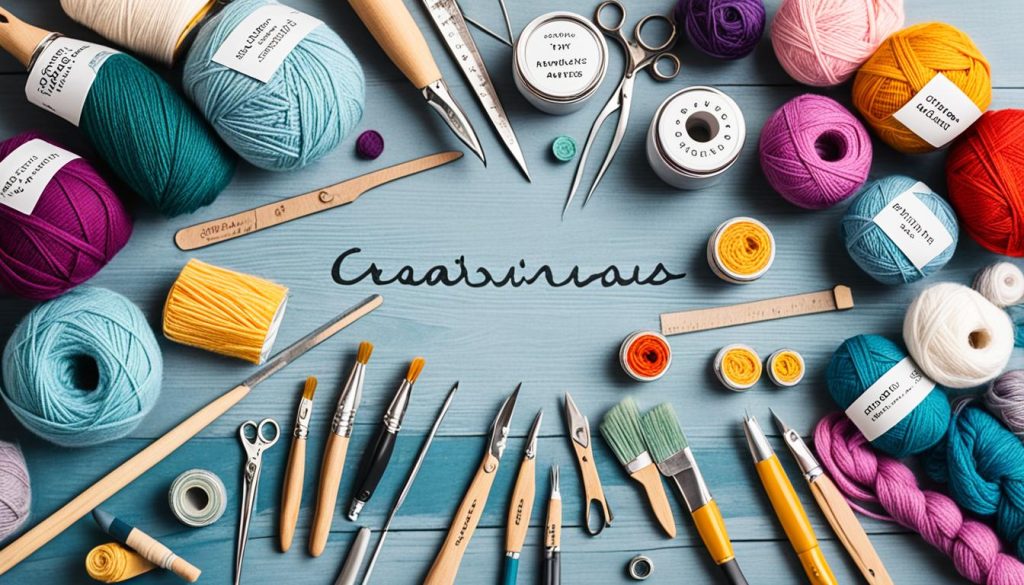Starting a handmade craft business in the UK can look tough but it’s doable. According to a 2021 article by Allison, many dreamers succeed each year. The main motivations are love for making things, seeking a flexible work life, and more time with loved ones. But, before you start, consider costs, where you’ll work, and what you need to learn for success.
- Why Start a Handmade Craft Business?
- Considerations Before Starting
- Value of the UK Craft Industry
- Selecting a Profitable Niche
- Workspace and Equipment Needs
- Legal Requirements for UK Businesses
- Setting Up a Handmade Craft Business in the UK
- Product Design and Development
- Sales Channels and Platforms
- Branding and Marketing Strategies
- Financial Planning and Pricing
- Time Management and Dedication
- Continuous Learning and Improvement
- Source Links
Key Takeaways
- Starting a craft business in the UK is achievable, but requires careful planning and consideration.
- Many people are drawn to craft entrepreneurship due to their passion for crafting, a need for flexibility, and the desire to spend more time with family.
- Startup costs, workspace requirements, and the learning curve involved in running a business are important factors to evaluate before launching a craft venture.
- The UK craft industry is a thriving market, worth over £5 billion, with significant growth in the 16-34 age bracket.
- Selecting the right craft niche, based on your interests, target audience, and cost of materials, is crucial for a profitable business.
Why Start a Handmade Craft Business?
Many people dream of running a handmade craft business because they love to create things. According to Allison, if you enjoy making items by hand, such as knitting or baking, you’re ahead. Having a passion for crafts can push you to start your own business.
Passion for Crafting
If you love crafting and want to turn it into a business, this path could be very rewarding. As per the article, those with strong crafting skills, like knitters or bakers, are already set. They know their craft well, which gives them an edge in business.
Flexible Working Life
Wanting a job that lets you work on your own terms is another reason. Allison mentions some are drawn to craft businesses for this very reason. It gives them the flexibility they need, especially for looking after children or managing personal matters.
Spend More Time with Family
Starting a craft business can also be a way to spend more time with your loved ones. Allison points out that this is key for those who wish to enjoy school holidays with their family. It offers a chance to balance work and family.
Considerations Before Starting
Before jumping into a craft business, think about some important points. Starting a craft business can need minimal or significant money, says Allison. For instance, she kick-started her business with just £150 from selling stuff on eBay. This shows that you don’t need a lot of money to start a craft business.
Startup Costs
It’s vital to thoroughly research the costs of starting a craft business. Knowing how much you need will make it easier to get your business going. Whether you get your funds from traditional methods or elsewhere, being clear on costs is key.
Workspace and Storage
Space is another thing to think about before starting. How much room your craft needs matters a lot. Allison’s jewellery business began on her dining table. This shows starting small is fine.
Learning Curve
Running a craft business means learning many new things, says Allison. She recommends focusing on one area at a time. This way, you can become good not only at your craft but also at the business side.
Value of the UK Craft Industry
The UK craft industry is booming, valued at over £5 billion. A 2021 article by Allison shared this news. It mentioned that 69% of UK women have tried a craft in the past year. This shows how many people in Britain enjoy crafting.
In fact, more young people are getting into crafting. The 16-34 age group has shown the most interest, according to the article. This presents a big opportunity for those who want to start a craft business. The UK craft market is growing fast, offering chances for brand-new entrepreneurs to step in.
The UK craft industry value‘s rise means it’s a great time to get involved. Craft makers can succeed by knowing what today’s consumers want. This sets the scene for a bright future in the craft industry.
Selecting a Profitable Niche
Starting a craft business means making key decisions, like which profitable craft niche to choose. As Allison points out, this choice can really affect how well your craft business does over time.
Existing Hobbies and Interests
Having a hobby or interest already, such as knitting or cake decorating, is a big advantage. It lets you use what you already know and love to reach your target customers better. Plus, it makes creating products a lot more fun.
Products You Would Buy Yourself
Think about what you’d like to buy when picking a craft business niche. For example, Allison likes to make jewellery and hair bows for kids. She does this because she understands what’s popular by looking at what she buys.
Perishable vs. Non-Perishable Items
Perishable items bring extra challenges. For example, baked goods need special certifications and careful storage. Plus, if they don’t sell, you might have to throw them away. Choosing non-perishable craft items can be simpler and less risky.
Cost of Materials
It’s crucial to consider material costs in your craft business. Allison advises looking for the best deals on supplies. Websites like DHGate and AliExpress can be great for finding affordable materials.
Workspace and Equipment Needs
Starting a craft business means you must think about where you work and what tools you need. Allison highlights the importance of knowing what your craft needs. For example, crafts like pottery need special tools that are expensive. If these tools break, it can slow down how much you can make.
When you start a craft business, it’s key to think about where you’ll work and what tools you need. The kind of craft you pick will change what space and tools you need. You might need room for making, storing, and showing off what you make. It’s also important to think about how much these tools will cost.
Allison says it’s smart for craft business starters to research their needs well. This can make sure your work area and tools fit what you do. Setting up the right workspace with the right tools makes your work go smoothly.
Legal Requirements for UK Businesses
When starting a craft business in the UK, you need to take some legal steps. This is true no matter the business form. Most craft businesses in the UK are single-person operations. This is because running it as a sole trader is the easiest.
Sole Trader vs. Limited Company
Deciding between a sole trader and a limited company is key. Being a sole trader means you’re self-employed. Your business and personal finances are not separate. So, you’re liable for any business debts or claims. A limited company is its own legal entity, offering more protection to its owner.
For many UK craft businesses, choosing the sole trader route is common. It’s simpler to get started and run. Yet, the article recommends deep thinking. Before choosing, craft business owners should look at the legal requirements for UK craft businesses. They should also consider the best business structure for craft businesses. Finally, they should understand the process of registering a craft business in the UK.
Setting Up a Handmade Craft Business in the UK
Setting up a handmade craft business in the UK is not just about making pretty things. You need to follow some important legal steps. First, you must register as self-employed. This is easy to do online or by post. It assures that your craft business is legal. It also means you’ll pay the right taxes.
Registering as Self-Employed
As you register, think about whether to be a sole trader or a limited company. Most UK craft businesses are sole traders. This choice is easier to manage. Yet, it’s smart to look into both options. Figure out which fits your craft business best.
Obtaining Licenses
You might also need special licenses or permits for certain crafts. This depends on what you make and where you’re located. For instance, selling food might need a food hygiene certificate. Or a local food-selling license could be necessary. Be sure to check what apply to your craft business. Make sure you’re meeting all the required laws and rules.
Product Design and Development
Making a successful product line is key for any craft business to grow and make money. Allison advises starting with deep market and audience research. This forms the base for creating craft items that your customers will love.
Target Audience Research
It’s vital to deeply research your target buyers when crafting a product line. This research should cover what they like, how they buy, and what they really need. Understanding your audience helps you tailor your craft products to meet their needs exactly.
Competitor Analysis
Looking at what other craft businesses offer can give you great ideas. Study your competitors’ designs, prices, and how they promote their products. Find where the market gaps are, so your craft items will be the ones that stand out to your audience.
Reproducible Product Line
Although unique items grab attention, Allison warns not to focus only on them. Creating a product line that can be made in batches makes production easier. It also helps meet the growing demand. This way, you can expand your business and make more money.
Sales Channels and Platforms
If you make crafts, you have many ways to sell them. You can use local markets, online sites like Etsy, or set up your shop online. These options help you reach more customers and boost craft business sales channels.
Local Craft Markets
Many crafters love selling at local markets and fairs. At these places, you can talk to people, show what you make, and see what they like. It’s also a chance to meet your community and get your brand known.
Online Marketplaces
Being on online marketplaces like Etsy or Amazon Handmade lets you sell to more people. These sites have lots of visitors already. But, you should check their fees and rules to make sure they’re good for you.
Setting Up an Online Store
Want more control? You can open your own online shop. Shopify can help you make a nice store easily. This way, you can give your customers a unique shopping experience and grow your relationship with them.
Branding and Marketing Strategies
Building a strong brand identity is key for craft businesses to succeed. This involves choosing the right name, logo, colours, and style. It all must connect with the audience and show the business’s unique character.
Brand Identity
Owners should focus on creating a brand that stands out. Every part, from the name to the look, should be thought through. A strong and memorable brand helps businesses gain loyalty and trust from customers.
Social Media Marketing
Social media is a great way for craft businesses to reach people easily and affordably. Using platforms like Instagram and Facebook, they can share beautiful content. This lets them connect with customers and lead them to their shops.
Email Marketing
Email marketing is also very useful for staying in touch with customers. By sending regular updates and special offers to their mailing list, businesses can keep their brand in people’s minds. This encourages customers to come back.
Financial Planning and Pricing
Financial planning is key for a thriving craft business in the UK. Owners need to figure out their startup, product, and overhead costs well. This helps them set prices that bring in profit.
Startup Costs
It’s vital to accurately figure out the costs of starting a craft business. This includes money for tools, materials, and any needed certs or licenses. By doing this, craft entrepreneurs can get the right funding and plan their prices wisely.
Direct Product Costs
It’s crucial for craft business owners to know the costs of making each item. This means adding up material, packaging, and shipping expenses. Getting a clear view of these costs is key to setting prices that keep the business going.
Overhead Expenses
The article also looks at overhead costs, like software fees and marketing expenses. Keeping an eye on these is important for pricing products well and staying profitable.
Pricing Strategy
The article suggests using a markup to decide product prices. It warns against underpricing to beat rivals, saying it’s risky. Instead, crafters should aim for fair prices that show off their product’s value and uniqueness.
Time Management and Dedication
Being a craft business owner means you have to be great at managing your time and staying dedicated. Keep working, even when you’re not selling much. Remember, business success takes time.
Finding a balance between work and life is hard for craft entrepreneurs. It’s easy for work and personal life to mix. Setting clear work times and saying no to extra tasks is vital to avoid getting too tired.
To do well in the craft world, you need to stay dedicated. Sometimes, the hard work you put in won’t show results right away. Keeping at it, being patient, and being flexible are important for your business’s success.
Working hard on time management and staying dedicated pays off for craft business owners. With these skills, they’re well on their way to succeed in the competitive UK craft market.
Continuous Learning and Improvement
Allison’s article points out a key to success for craft business owners. They need to keep learning and improving. In entrepreneurship, learning never stops. There’s always more to learn and new skills to pick up. Mistakes are lessons, and new paths are waiting to be explored. The article stresses the importance of ongoing learning and trying new things for success.
Becoming skilled at adapting is crucial for craft businesses. They must keep up with what’s new in the industry and what customers want. By regularly improving their products and how they’re sold, craft business owners can stay relevant. This process helps them keep their place in the market.
In the craft world, being innovative is vital. The article highlights this by saying craft entrepreneurs should be creative and try new things. This could mean using unusual materials, creating unique products, or developing fresh ways to connect with customers. To stay ahead, craft businesses need to be creative and daring.
















